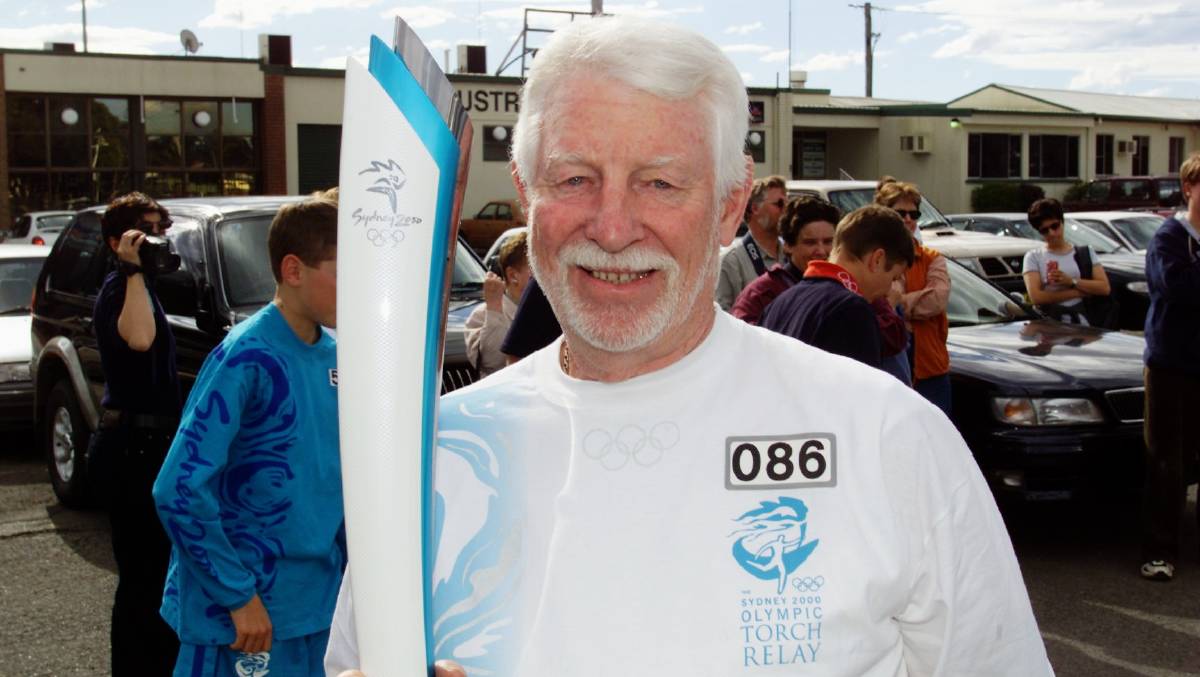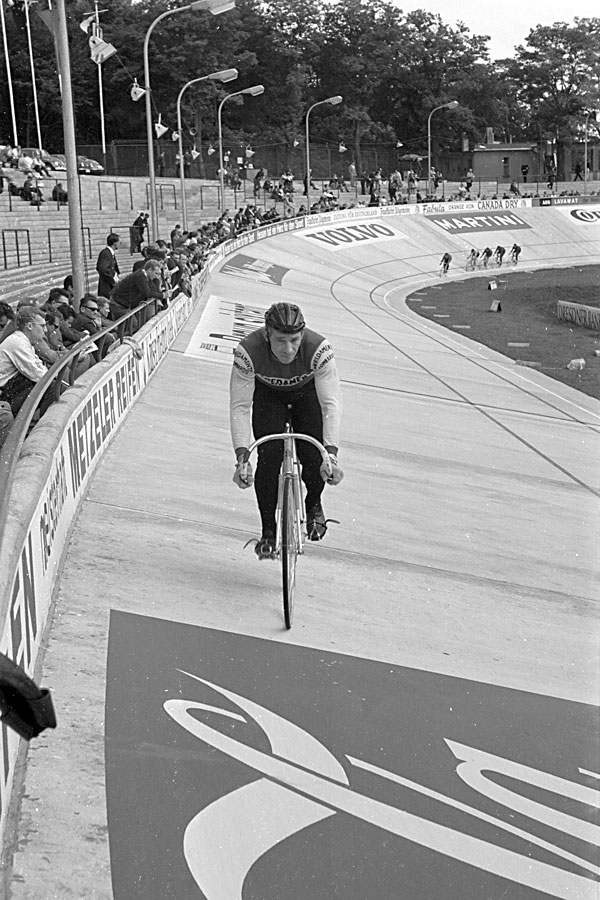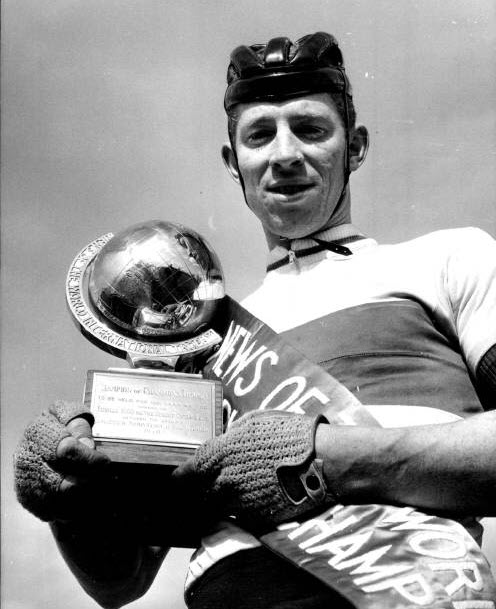A man who caught the tail end of the Golden Age of sprinting wave back in the 60’s was Australian Ron Baensch. Ron was born in 1939 but still rides his track bike twice each week;
“Us old guys ride a 40 lapper!”
– he delights in telling us – but that’s fitted in between his daily sea swim, fishing and hunting.
Ron raced in a time when sprinting was a tactical game and the men who practiced it weren’t shrink-wrapped into speedsuits and Kask helmets with reflective visors…
Things have changed a bit since Ron’s days; the route that sprinting has taken is perhaps best summed up by the BBC commentary team’s insistence at the recent World Cup in Manchester in referring to Kevin Sireau as “world champion” – Gregory Bauge is in fact the champion, and has been for two years.

But it’s understandable under the, ‘big, strong, fast French guy’ principle – albeit Kev is a bit paler than Gregory.
Russian coach Heiko Salzwedel puts it like this;
“The sprints are more like time trial time trials now, but with another rider on the track, tactics don’t play as big a part anymore.”
Commonwealth Games sprint champion Shane Perkins tells a similar story;
“It’s very hard to wind it up from “cat and mouse” stuff so the sprint tends to open up earlier, to let riders get the big gear rolling.”
* * *
Let’s go back to 1960 and Ron Baensch is Australian national champion in the sprint, 10 mile and team pursuit.
His performances take him to the Rome Olympics where he comes up against home hero Sante Gaiardoni who was en route to a kilometre and sprint double.
Ron takes up the story;
“I had a bit of a struggle with Gaiardoni in the semis, we both fell off and I landed on top of him, he got a bit cranky after that!
“In the next heat he took off from the start and did the full 1000 metres in 1:07 – that was quick back then, I chased him all the way but hardly made a metre on him.”
Ron would finish the competition in fourth spot, the first of six occasions on which he’d make the top four of a world level sprint competition.
The trip to Europe gave Ron a taste of cycling in the Heartland and he wanted more – he approached the Australian Cycling Federation and asked if they’d help with the fare;
“They offered me Ј20 so I told them where to stick it.“The fare is probably cheaper now than it was back then.”

In 1961 Ron was again on the podium with bronze in the amateur sprint – this was in the days before today’s ‘open’ competition, until 1992 there were separate amateur and professional competitions.
Again, it was an Italian on top of the podium, Sergio Bianchetto; not a man to talk in code. Ron has his own theories about his difficulties with Italians at the Worlds;
“The UCI would fix the draw so that I’d come against the Italians’ third string sprinter in the early rounds.
“They’d tell him to rough me up, take me to the fence and stuff like that, they’d get away with that, but they were hoping that I’d retaliate – which I often did – and they could disqualify me.”
Ron’s best chance of being the champion was 1964 when he was second to legendary, seven times world champion, Antonio Maspes (you can guess his nationality).
“I took off early as he climbed the banking, it was a brilliant move but I committed an error which my coach always warned me about if you pull a move like that – I looked back.
“I ran off the bottom track and he caught me on the line.”
Maspes ‘chopped’ Ron in the next match, coming hard across the Australian’s front wheel; to the disgust of the Parisian crowd the commissaires did nothing and the Italian was booed throughout the victory ceremony.
Ron explains;
“The Italian stitching-up of sprinting was what made Patrick Sercu turn to the road – he was flicked a couple of times, too.”
Ron took bronze in the pro sprint in ’65 and silver again in ’66 behind Giuseppe (Joe) Beghetto who went on to have a respectable road career.
We asked Ron if there was money to be made from ‘revenge’ matches;
“Those were the dying days of pro sprinting; Maspes would disappear after the Worlds and wouldn’t surface again until the next year – he was partly responsible for the demise of pro sprinting.
“To make money, I had to turn my hand to other things, I’d ride the kermises in Belgium and go for the early primes – but my main source of income was to ride the Six Days.
“I was fast enough and good at creating excitement but I didn’t really like it – 18 hours each day in the saddle.
“I wasn’t bad behind the Dernys either and beat Peter Post and Patrick Sercu on occasion.”
Ron rode with some of the top names of the day – big motors specialists Leo Prost, Theo Verschueren and Romain de Loof; pursuiters Hugh Porter and Hugo Scrayen and his old sprint opponent Beghetto.
But his favourite partner was road racing legend – the late, great Tom Simpson;
“Tom was the best partner I ever had, I had the speed and he could just go, go, go.
“Having said that, he could sprint, too – he was a real all rounder.
“I think that given another season together we could have broken into the top two or three teams and become part of the “Blue Train” which ruled the roost – but sadly, Tom died on Mont Ventoux in 1967.
“I would get about $3,000 dollars to ride a Six Day – you’d take about half of that home after you’d paid your soigneur and mechanic; Tom was on $3,000 per day!”
Continuing on the subject of money, we asked how he’d done with the teams he rode for;
“I rode for Libertas for two years, I got Noel Fore’s last year’s Flandria bike; with Casagrande I got a nice parcel of cycling clothing – shorts, jerseys and tracksuits but not a cent.
“I’m down has having ridden for the British Carlton team in 1970 but all I got was two frames – I didn’t do very well out of being with teams!”
In a world where rich federations dominate, we asked Ron how much help he got from his federation;
“They didn’t treat me well, I didn’t get a cent from them – in fact, they still owe me money.
“In those days, if you made the last four at the Worlds, you got a share of the gate money, it was sent to your federation.
“In 1970 when my countryman Gordon Johnston won the Worlds at Leicester, he got his money – I went out to an Italian that year, he switched me in the finish straight but the commissaires did nothing.
“Anyway, when I got home I asked the federation about my gate money and they told me to apply in writing; which I did, but never saw a red cent of it – and I was in the top four on six occasions.”
We had to ask Ron the inevitable question about what he thinks of sprinting nowadays;
“I sprinted on big gears for the day, 94”/96” – but in the Sixes we all rode 52 x 16 – nowadays they’re all on 100” plus.
“Maspes and I could go sub 11 seconds on those gears – 10.8 – when I coached the Danish team I used to lead them out and could do a succession of low 11 second rides.
“Back then, it was all outdoors and I think I was actually the last guy to ride the Olympics on steel cranks with cotter pins.
“For me the tracks they use for the sprints now aren’t suitable, they’re too short in the straights, it’s all about drag racing, and it’s so hard to come over the top – there’s no excitement in the finishing straight.”

Any thoughts on sprinting today?
“As for the ‘contact’ rules, where’s the animosity?
“What’s that keirin about? You have six of the world’s best sprinters but they’re not meant to touch each other; ‘oh sorry, did I bump you there?'”
After Ron’s cycling days were over, he took an unusual career path;
“I got a job driving trucks in Sweden, through a friend, I loved it. I used to drive up to the Arctic Circle, down to Portugal and Greece – I was young and fit and could drive for long periods, sometimes passing through four countries in a day.
“I came back to Australia in 1974 and got a good job on the oil rigs, here in Newcastle – it was good money and enabled me to put the deposit down on this old house.
“I came back from Europe with nothing, I had to borrow the air fare home from my mum – it took me a year to pay her back.”I raced locally up until 1980, in fact, I won my last race – a pursuit race; we caught the last guys in the finish straight.”
We really knew the answer before we asked this question – any regrets?;
“No, I loved the bike, did what I wanted to do; I loved driving the trucks; I used to drive about like a madman; now I have my swimming, fishing, shooting and biking – I’ve been blessed.”
And finally, we had to ask Ron about the story we heard of his jumping on the bonnet of a car in Belgium because the driver had cut him up;
“Yeah, that’s true! Eventually he got brave enough to come out of the car – then I knocked him out!”
They just don’t make them like Ron, anymore.



